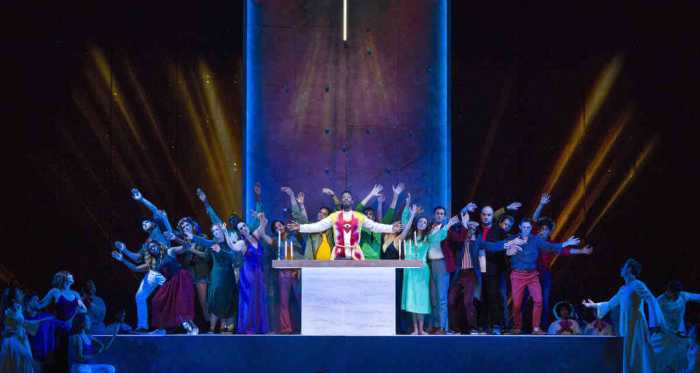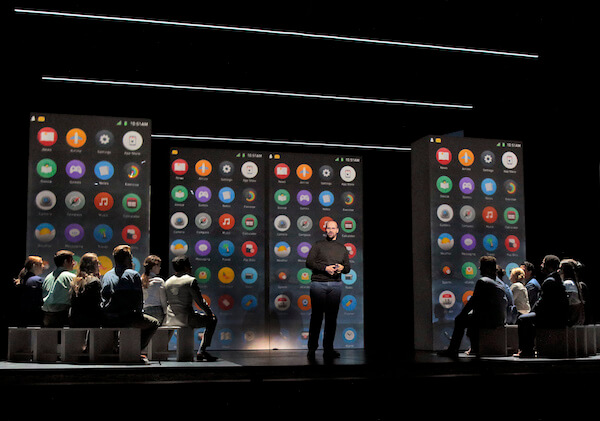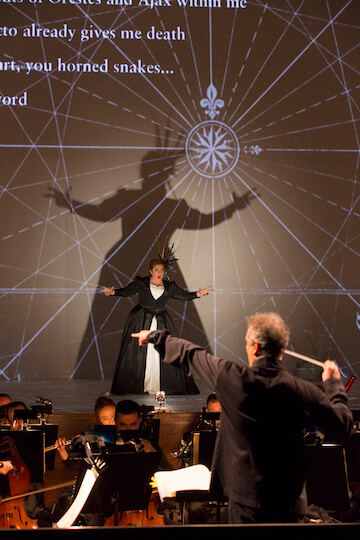Eric Owens in the Collegiate Chorale’s performance of Boito’s “Mefistofele,” conducted by James Bagwell. | ERIN BAIANO
BY ELI JACOBSON | Audiences faced this October and November, two of the busiest months on the opera and vocal calendar, with City Opera sadly a thing of the past and Opera Orchestra of New York still silent about the current season. Fortunately, for musical opportunities outside the Metropolitan Opera, small opera companies and concert presenters rushed to fill the void.
For 19 seasons, Teatro Grattacielo has been educating New York operaphiles on the diversity and eclecticism of Italy’s verismo school of composition. Rather than dealing exclusively with gritty realism, verismo covers a wide range of musical styles and dramatic genres that reflect international influences — including faux Orientalism.
On November 19, Teatro Grattacielo presented Franco Alfano’s “Sakùntala,” which premiered in 1921 with a libretto by the composer based on the Sanskrit legend. “Sakùntala” is considered Alfano’s best work and influenced Casa Ricordi to select Alfano to complete Puccini’s unfinished “Turandot.” Artistic director Duane Printz chose Alfano’s 1951 re-orchestration, finding it more harmonically rich and sophisticated than the recently rediscovered original version.
Small companies offer rich vocal harvest in season deprived of NYCO, OONY
The lushly orchestrated work reveals the influence of Ravel and Debussy, with hints of Richard Strauss. However, what we have here is yet another case of “all sauce and no meat.” The orchestra bathes us in exotic harmonies and colors, but concrete melodies fail to coalesce. The singers, saddled with difficult high-lying music, strain their vocal resources to little effect since there are no memorable arias. The audience savors the music’s exotic perfume but it evaporates in the memory after the last note dies away.
Michelle Johnson as Sakùntala sounded voluptuous when the music didn’t press her rich soprano too hard. Tenor Raúl Melo as the King handled the relentless declamation in the passaggio with firm musicianship and unflagging technical command. Mezzo Shirin Eskandani and bass Ashraf Sewailam were striking in supporting roles.
Conductor Israel Gursky reveled a little too much in the sumptuous textures of the score — too often the orchestra overpowered the soloists.
Praise and gratitude must again be given to Printz for recruiting fine musicians in a well-rehearsed performance illuminating a forgotten but fascinating chapter of operatic history.
The Collegiate Chorale, on November 6, presented as its annual operatic offering Boito’s “Mefistofele” in concert at Carnegie Hall.
Boito’s adaptation of Goethe’s “Faust,” with its huge choruses, episodic dramatic structure, and colorful orchestral interludes, is well suited to concert presentation. In the title role, bass-baritone Eric Owens unfortunately seemed vocally and physically below his best (a throat infection had him seated on a raised stool chair throughout the concert). Despite indisposition, he maintained his distinctive dark mahogany color throughout the wide compass of the role. But the Prologue, Act I, and Act II were played without a break, and Owens’ stamina failed him on a crucial high phrase just before intermission.
Juliana Di Giacomo’s full lyric soprano sounded youthful and luscious, but she was chary with her chest voice and a tentative flutter in the high range shortchanged several high climaxes in the Prison Scene. Arturo Chacòn-Cruz’s lean bright tenor — very Italiante — lacked expansion but was firm and evenly balanced throughout the range.
Conductor James Bagwell kept the multitudinous Collegiate Chorale and American Symphony Orchestra together but couldn’t synthesize Boito’s eclectic score into a convincing musico-dramatic whole. Italian opera is not his domain.
In late October, Gotham Chamber Opera took a walk on the musicological wild side, restaging the four original avant-garde one-act operas that premiered at the Baden-Baden Festival of 1927. I suspect that even in 1927, this was a less than satisfying musical mixed bag.
Darius Milhaud’s “L’Enlèvement d’Europe” (“The Abduction of Europa”) is an eight-minute mythological tableau that describes the plot in the third person rather than dramatizing it directly.
Milhaud’s score is a sensuous but aimless wash of French impressionism — better suited as musical background for a modern dance work or experimental film. Director Paul Curran placed the action in the present day, depicting a fatal love triangle playing out in a chic art gallery — paintings by Georg Baselitz provided the background for the gallery and appeared in the program’s other three operas.
Ernst Toch’s “Die Prinzessin auf der Erbse” (“The Princess and the Pea”) was also updated as the taping of a reality television show with the self-dramatizing, spoiled “royal family” done up as the infamous Kardashian clan. Both the staging and the music were ceaselessly busy and self-consciously striving for effect without much real substance (much like the real Kardashians).
Stick with Mary Rodgers’ “Once Upon a Mattress” for this story.
Paul Hindemith’s “Hin und Zurück” (“Hither and Back”) played out a crime of passion and then ran it in reverse. Here, the clever staging utilizing projections aptly simulated the effect of a vintage film reel ran in reverse. Hindemith’s score is witty and harmonically spiky.
The six songs that comprise Kurt Weill and Bertolt Brecht’s “Mahagonny Singspiel” lay out the basic themes of the later full work “The Rise and Fall of the City of Mahagonny.” Weill’s music is way more memorable than the other three works but dramatically this is just a preliminary sketch and the staging seemed random and pointless.
As the formidable Kris Jenner look-alike Queen in the Toch piece, soprano Helen Donath — a veteran of 53 operatic seasons — reveled in a bright tireless upper register and perfect German diction. Donath lacked vocal pith lower in her range in the Weill singspiel. Mezzo Jennifer Rivera shone in several roles as did veteran basso John Cheek. The polished chamber orchestra under music director Neal Goren’s disciplined baton made the best musical case for each of these disparate works.



































